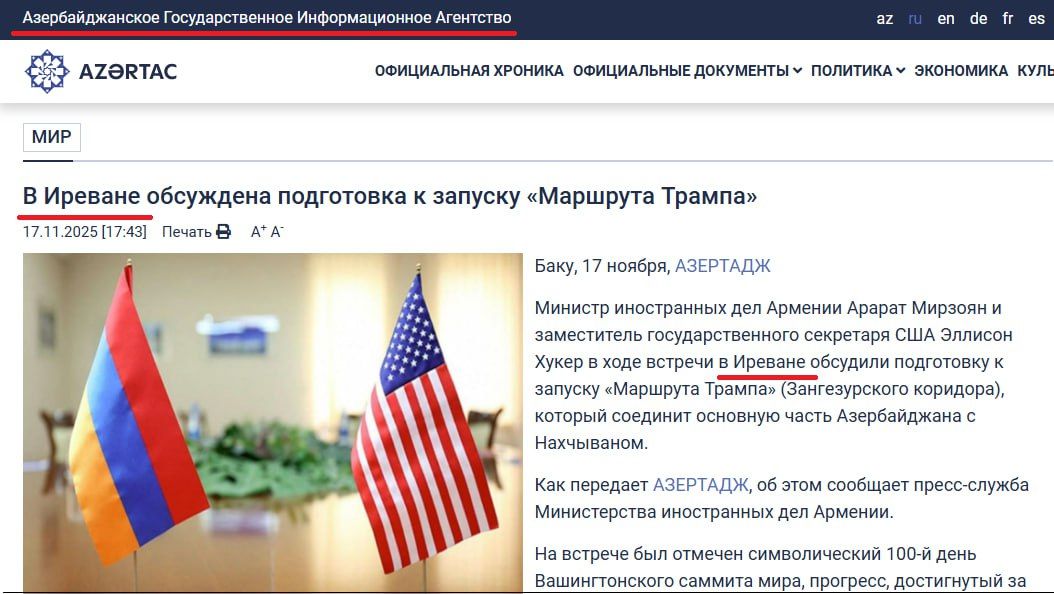Language becomes next battleground as peace approaches in S Caucasus

As Azerbaijan and Armenia move closer to a peace agreement, and as current and "potential" issues are raised, it is not surprising that some parties with no interest in peace will try to sabotage it. This conflict, which has lasted for years, has always had two sides: those who want some form of peace, and the "fascist" ideologues who oppose peace, seek eternal hostility, and hope for war. This time, the issue came from a rather interesting and amusing issue.
Every multilingual region has its own linguistic ecosystem, a tapestry of names, pronunciations, and historical terms shaped by centuries of coexistence. What to one nation is a standard expression may sound unfamiliar to another, but this is precisely how language works. Yet in the South Caucasus, even linguistic variation is now being framed as a political act. The recent uproar over Azerbaijan’s state news agency using the term “İrevan” is a prime example of how manufactured sensitivities are being leveraged to create controversy where none objectively exists.
An Armenian Telegram channel portraying the use of the term “İrevan” by Azerbaijan’s State Information Agency as a “provocation” has once again demonstrated how trivial issues are being weaponized at a sensitive moment in the peace process. The channel described the spelling as “shameful” and “cheap,” linking it dramatically to the visit of U.S. Deputy Secretary of State Allison Hooker. Yet the outrage itself lacks substance and reveals far more about the insecurities of those provoking it than about Azerbaijan’s linguistic choices.

At its core, the debate is not about geography, but about language. The name of Yerevan, like the names of countless cities and countries around the world, varies across languages according to phonetic, historical, and etymological norms. This is neither disrespectful nor unusual, it is the natural evolution of language.
The term “İrevan” is neither a provocation nor an invention. It is the traditional Azerbaijani rendering of the city’s name, rooted in linguistic evolution, regional history, and centuries of Azerbaijani presence in what is today the Republic of Armenia. The region was historically known by many names, including “Revan,” “Erivan,” and “Iravan” in various Persian, Ottoman, Azerbaijani, and Russian sources. Even Tsarist-era maps and administrative documents used the form “Erivan Governorate.” These variations are well-documented and reflect the multicultural past of the region.
To accuse Azerbaijan of “distorting” Yerevan’s name, therefore, ignores the global norm: cities and countries are almost always pronounced differently in other languages. This is a universal linguistic phenomenon, not a political message.
Consider just a few examples:
- Armenians say Hayastan, while the world says Armenia. The same thing goes for the Georgians; they call it Sakartvelo, we, for example, call it "Gürcüstan".
- Germans call their country Deutschland, but it becomes Germany, Allemagne, Alemania, Nemetsko, and more across Europe.
- The French call London Londres, Greeks say Λονδίνο, while in Turkish it is Londra.
- Italians say Monaco di Baviera instead of Munich, the English say Florence instead of Firenze, and the Koreans say Miguk for America.
No one interprets these linguistic variations as disrespect or political hostility. They are simply what languages do — they adapt foreign names into their own phonetic and grammatical systems.
The Armenian Telegram channel’s claim, however, was dramatic:
“Let us emphasize that this is the Azerbaijani state news agency generating cheap provocations… If you have something to say, say it directly, and if not, stop these shameful provocations!”
But this outrage collapses under basic scrutiny. There is no “provocation” in using a traditional Azerbaijani term — especially one widely documented in historical sources and used in Azerbaijani terminology for generations.
What the channel presents as a diplomacy-shaking scandal is thus nothing more than a linguistic fact.
Even the analogy they attempted, imagining Armenpress calling Baku “Pakui” or “Atrashen”, fundamentally misunderstands the issue. These are fabricated names with no linguistic or historical connection. “İrevan,” however, has deep etymological roots reflecting centuries of local usage by different communities.
The broader context cannot be ignored. As Armenia and Azerbaijan move closer to a peace agreement, attempts to politicize trivialities have intensified. Some lobbying networks clearly view normalization as a threat to their narrative and influence, and thus seize any opportunity, no matter how trivial, to manufacture tension.
Instead of contributing to constructive dialogue, such actors:
- inflate harmless terminology into “provocations,”
- frame linguistic norms as geopolitical tools,
- and attempt to portray Azerbaijan as deliberately antagonistic at a time when diplomatic progress is accelerating.
This pattern reveals a deeper problem: when a peace process advances, those who benefit from conflict narratives scramble to invent new points of friction.
Ultimately, trivial controversies like this do not weaken Azerbaijan — they weaken the credibility of those trying to create them. The South Caucasus has endured too much instability to allow linguistic differences to be weaponized as political firestorms.
If peace is truly the goal, then acknowledging basic linguistic realities should not be controversial. It should be ordinary.
The road to normalization will be smoother when both societies, and especially the loudest commentators within them, recognize that coexistence begins with accepting difference, not fearing it.
Here we are to serve you with news right now. It does not cost much, but worth your attention.
Choose to support open, independent, quality journalism and subscribe on a monthly basis.
By subscribing to our online newspaper, you can have full digital access to all news, analysis, and much more.
You can also follow AzerNEWS on Twitter @AzerNewsAz or Facebook @AzerNewsNewspaper
Thank you!

